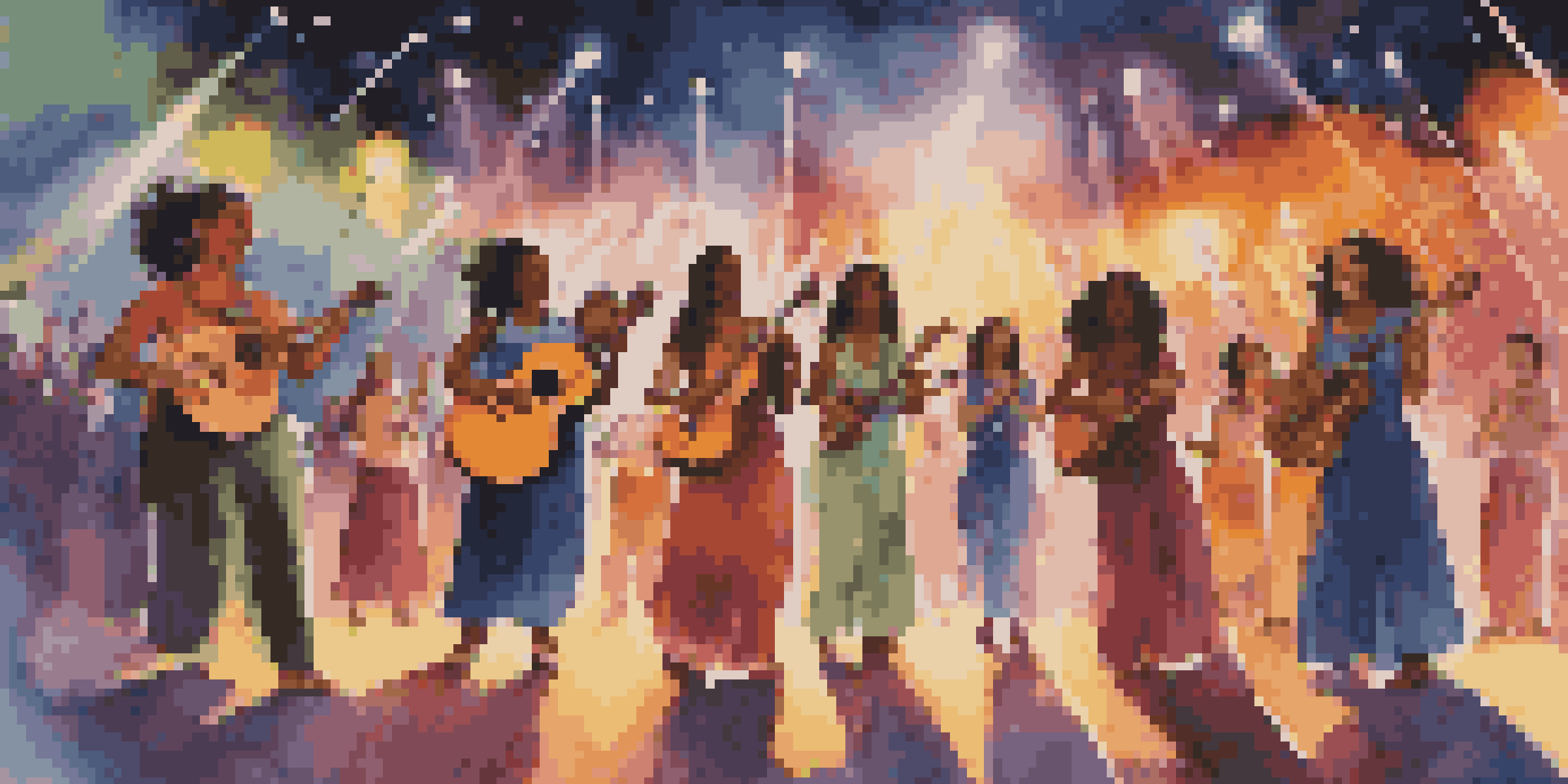The Role of Women in Music and Identity Formation

Women as Pioneers in Music History
Throughout history, women have played pivotal roles in shaping music, often breaking barriers in male-dominated genres. From classical composers like Clara Schumann to jazz legends like Billie Holiday, their contributions have been transformative. These women not only created music but also challenged societal norms, paving the way for future generations of female artists.
Music is the shorthand of emotion.
The impact of these trailblazers extends beyond their music; they became symbols of empowerment. Their stories inspire young women to pursue their passions, showing that music can be both a career and a means of self-expression. As more women share their journeys, they highlight the importance of representation in the arts.
Today, female musicians continue to inspire and influence identity formation through their work. As role models, they encourage individuals to embrace their unique stories, proving that music is a powerful tool for personal and collective identity.
Music as a Reflection of Identity
Music often serves as a mirror reflecting the identities of both artists and listeners. For many women, crafting songs about their lived experiences allows them to express their individuality and cultural backgrounds. Whether it’s through lyrics that tackle social issues or melodies that evoke personal memories, music becomes an intimate expression of self.

Take, for example, the rise of genres like hip-hop, where female artists like Nicki Minaj and Cardi B use their platforms to discuss empowerment and resilience. Their music resonates with listeners who may share similar experiences, fostering a sense of belonging and understanding. This connection is vital in forming identity, as it shows how shared experiences can unite diverse groups.
Women Shape Music and Identity
Throughout history, female musicians have broken barriers and inspired others by using their art to express individuality and empowerment.
Moreover, music often provides a safe space for women to explore their identities, whether related to gender, race, or sexuality. Through their art, they challenge stereotypes and create narratives that reflect their truths, ultimately reshaping the societal dialogue around identity.
Cultural Influences on Women's Music
Cultural backgrounds significantly influence the music that women create and perform. Different cultures have unique musical traditions that shape the sounds and themes prevalent in female-led songs. For instance, women in folk music often draw from their heritage to tell stories that resonate with their communities.
The power of music makes all the difference. It can change your mood, shape your identity, and help you embrace who you are.
In many cultures, music serves as a form of resistance, allowing women to voice their struggles against oppression. Artists like Shakira and Angelique Kidjo use their music to highlight issues faced by women in their societies, bridging cultural gaps and promoting awareness on a global scale. This cultural exchange enriches the music landscape and encourages dialogue about identity.
Additionally, the globalization of music has allowed women to blend traditional sounds with modern influences. This fusion creates a dynamic platform for self-expression, enabling artists to redefine what it means to belong to a particular culture while embracing their individual identities.
The Role of Lyrics in Identity Formation
Lyrics play a crucial role in how women articulate their identities and experiences. Through storytelling, female artists can share their struggles, triumphs, and hopes, resonating deeply with listeners. Songs can serve as anthems for movements, providing a voice for those who feel unheard.
For instance, the empowering lyrics of songs like Beyoncé's 'Run the World (Girls)' challenge traditional gender roles and inspire women to assert their strength. Such powerful messages help listeners reflect on their own identities and encourage them to embrace their power and agency. The emotional connection formed through relatable lyrics fosters a sense of community among women.
Cultural Influence on Women's Music
Cultural backgrounds significantly shape women's music, allowing them to blend traditional sounds with modern influences to create unique narratives.
Moreover, lyrics can provoke thought and inspire change, pushing societal boundaries. By addressing complex issues such as mental health, inequality, and self-acceptance, female musicians contribute to broader conversations about identity and well-being, allowing listeners to navigate their personal journeys more effectively.
Women in Music and Social Change
Female musicians have historically been at the forefront of social change, using their platforms to advocate for various causes. From protest songs during the civil rights movement to contemporary movements like #MeToo, women in music have voiced the concerns of their communities and sparked vital conversations. Their activism often intertwines with their artistry, creating a powerful synergy.
Artists like Joan Baez and Madonna have used their music to challenge societal norms and advocate for human rights. Their influence extends beyond music, inspiring listeners to engage with social issues and take action. This interplay between music and activism demonstrates how art can be a catalyst for change, shaping identities and communities.
As more women continue to rise in the industry, their activism becomes a central theme in their work. This not only empowers other women but also encourages a collective movement toward equality and justice, highlighting the crucial role of music in societal transformation.
The Importance of Representation in Music
Representation in music is vital for fostering diverse identities and narratives. When women from various backgrounds see themselves reflected in popular music, it validates their experiences and encourages them to pursue their passions. This visibility is essential in dismantling stereotypes and expanding the narrative around women in the music industry.
In recent years, there has been a noticeable shift towards inclusivity, with more female artists gaining recognition across genres. Events like the Women’s Music Festival celebrate these voices, showcasing the talent and creativity of women in music. Such initiatives not only empower artists but also inspire listeners to embrace their identities.
Representation Drives Change
Increased representation of women in music is essential for validating diverse experiences and challenging stereotypes within the industry.
Furthermore, representation helps cultivate a more inclusive music landscape, challenging the status quo. By uplifting diverse voices, we can create a richer tapestry of stories that resonate with a broader audience, ultimately reshaping how identity is perceived in society.
The Future of Women in Music and Identity
As we look to the future, the role of women in music will continue to evolve, shaping identities in new and exciting ways. With advancements in technology and social media, female artists have unprecedented access to platforms that amplify their voices. This democratization of music creation allows for a more diverse range of stories and perspectives to emerge.
Emerging artists are increasingly using their platforms to address pressing issues, from mental health to climate change, ensuring that the conversation around identity remains relevant. This new wave of musicians is not only pushing creative boundaries but also redefining what it means to be a woman in the music industry today.

Ultimately, the future of women in music promises to be vibrant and impactful, as these artists continue to inspire and empower others through their work. By embracing their identities and sharing their stories, they contribute to a rich cultural landscape that fosters connection and understanding.